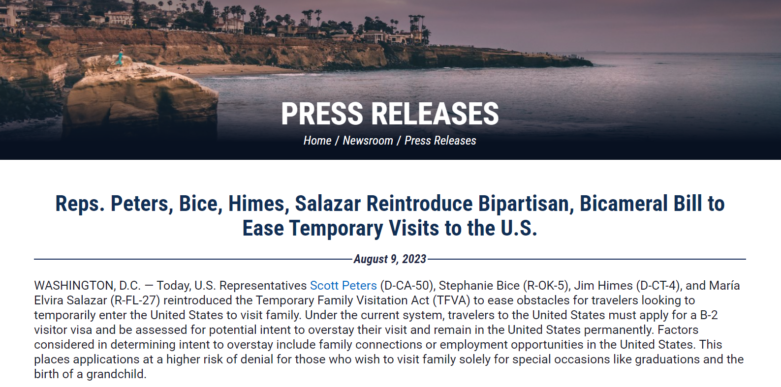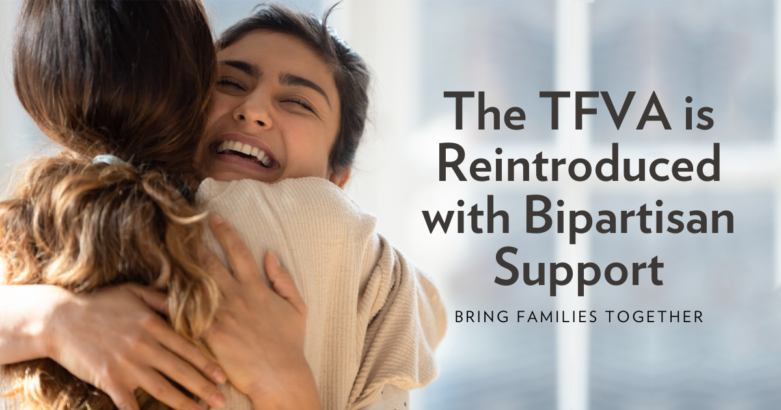Jordan Heller | October 23, 2023
Read the original article from Ideaspace
Last month, a bipartisan group of U.S. House members reintroduced the Temporary Family Visitation Act (TFVA), a bill that would create a new nonimmigrant visa for foreign nationals who wish to visit family members in the U.S. As Ideaspace first reported in June of 2022, the bill would address a catch-22 in which foreign nationals with a legitimate reason to visit the U.S. — to connect with relatives who are U.S. citizens OR LAWFUL PERMANENT RESIDENTS — are routinely denied a tourist visa precisely because of those family ties.
Paris Etemadi Scott, an immigration attorney based in San Jose, California, told Ideaspace that the predicament is commonplace among the many Persian-speaking immigrants she serves. When an applicant for a tourist visa has family ties in the U.S., she explained, a U.S. consular officer will oftentimes reject the application on the basis that because of those family ties the applicant intends to immigrate. Congress itself detailed the issue in a 2014 CRS report.
“And for these families, when that tourist visa gets denied, they have no other option but to apply for that rigorous immigrant visa,” said Scott, explaining how the government is inadvertently driving up Green Card applications by individuals who have no intention to immigrate.
The TFVA was originally introduced in the House of Representatives in May of 2021, and ultimately garnered 31 House Democrats and 18 House Republicans as co-sponsors — broad bipartisan support by any measure. But the bill floundered in the waning days of the 117th Congress after the House Judiciary Committee asked the State Department — the agency that would be tasked with issuing the new visas — for technical assistance. Among other concerns, State objected on the grounds that the new law would compromise the discretion of U.S. consular officers. Furthermore, State claimed there was no need for the bill as the tourist visas were meeting demand. Fearing the prospects for the bill would be dim without State’s support, TFVA authors did not feel confident advancing the bill out of the Judiciary Committee.
It’s a situation that frustrated supporters of the TFVA, as unelected government officials were effectively obstructing the legislative process.
“I’m not sure the State Department sees it the same way as our citizens do,” said Rep. Scott Peters, a Democrat from southern California who reintroduced the TFVA with Republican congresswomen Stephanie Bice and María Salazar. “People can’t get the ability to visit family because they’re denied a visa. And parents should be able to attend their kids’ weddings, and children should be able to attend their parents’ funerals. And I would just say to the State Department, that’s not happening right now. And they may think that that’s fine, but I think a lot of us in a very bipartisan way don’t believe that that’s fine.
“And as far as [State’s] discretion,” continued Rep. Peters. “I guess that it’s the Congress that sets these priorities in conjunction with the president.”
John-Mark Kolb, the deputy chief of staff to Rep. Salazar, one of the two Republican congresswomen who reintroduced the TFVA with Rep. Peters, also disputed State’s position on the bill.
“Our constituents are pissed,” said Kolb, whose boss’s congressional district covers much of Miami-Dade County in South Florida, home to a large immigrant population with roots in Latin America. “We have one constituent with a family member in Bogotá, Colombia. Last time I checked, the wait to get an appointment just to see if you qualify for a visitor visa was over two and a half years. And then if the consular officer says, ‘No. Denied,’ then you’re saying you have to go through that process again? It’s absurd.”
Kolb went on to explain how the COVID-19 pandemic only exacerbated the problem. With consular offices shut down due to pandemic protocols and no online processing put into place, the backlog grew to historic proportions.
“If [State] is going to tell people to work from home, you need to figure out a process to do this [online],” said Kolb, whose office introduced a separate bill to address the extended wait times. Kolb said that on this issue, too, State denied the existence of a problem. “And then when Congress has to step in and say, ‘Okay, we’re going to fix this,’ don’t tell me there’s not a problem.”
Nevertheless, after the conclusion of the 117th Congress, TFVA authors set about addressing the State Department’s concerns. If for nothing else, so that if and when the bill reaches the White House, the president can push aside any remaining concerns of the State Department.
Regarding the claim that tourist visas are meeting demand, lawmakers added an amendment to the FY24 State, Operations Appropriations Bill requiring the State Department to audit its rejections of nonimmigrant visa applications based on the presumption that those applicants intended to immigrate, which falls under Section 214(b) of the Immigration and Nationality Act. Currently, records do not show the reason a consular officer invoked Section 214(b). TFVA supporters expect the audit will show that a significant number of those 214(b) rejections were based on applicants’ family ties to the U.S. In addition to neutralizing State’s claim that tourist visas are meeting demand, TFVA supporters believe that such an audit will help garner more congressional support for the bill.
TFVA authors also added revisions to the bill itself, including language that would require petitioners to state that a family member wishing to visit the U.S. had not previously overstayed a visa, and, most importantly, language meant to retain the discretion of consular officers. If an applicant meets all requirements needed to avoid a 214(b) rejection, a consular officer will have other grounds for denial, like national security concerns.
Despite their frustrations with State, both Rep. Peters and Deputy Chief of Staff Kolb are ultimately happy that State had the opportunity to offer input on the latest iteration of the bill.
“Agencies have the right to give their opinions on legislation when asked,” said Kolb. “And I know [that State] made technical changes to the bill to make it better. Writing bills can be hard sometimes, and there’s little lines that you can tweak and things that members of Congress don’t see on the front end, and that’s part of the legislative process. So they did provide valuable feedback on actually, if this bill becomes law, changing this word here would make it better.”
Said Rep. Peters: “At the end of the day, it’s the State Department that’s going to be implementing the law. And so it’s good to have them on board and ready to be able to successfully implement it, if those laws are going to make a difference.”
With the State Department’s concerns addressed and the bill reintroduced in the House, now the challenge for the TFVA is navigating the 118th Congress. The Republican conference’s failure to unite behind a speaker shows that the House remains in thrall to some of the GOP’s most extremist, anti-immigration elements, so getting the TFVA to a vote on the House floor would seem an uphill climb. But some in Congress, including Rep. Peters, see an impasse on comprehensive immigration reform as an opening for smaller, more niche pieces of legislation like the TFVA.
As Rep. Peters told me in a previous article about the prospects for immigration reform in the 118th Congress, many members often refrain from spending their political capital on narrow reforms like the TFVA, out of fear that such votes will weaken their leverage for passing bigger priorities like the DREAM Act. “But it’s been pretty clear over the last 10 years that comprehensive immigration reform is maybe an elephant that has to be eaten one bite at a time,” said the congressman. “So, for me, I’m willing to take smaller bites.”
As the thinking goes, with comprehensive immigration reform being a non-starter in the 118th Congress, there’s plenty of appetite for reforming the immigration system piecemeal. Furthermore, smaller bills like the TFVA do not generate the same political heat as comprehensive reforms.
“A lot of this [small] stuff goes under the radar,” said Rep. Peters.
Beyond the smallness of the TFVA, Kolb believes the bill has qualities that are uniquely attractive to Republican House members. Namely, its focus on family, economics, and security.
“Republicans believe in family values,” said Kolb. “But we also have security to think about. And this bill helps bridge that gap and allow families to see their loved ones, but in a way that protects the integrity of our immigration system because these are temporary visas. And there are safeguards put in place to protect against visa overstays.
“Of course on the economic side, the U.S. brings a lot of tourists every year,” said Kolb. “But we have room to grow on tourism and this [bill would help that growth].
According to the U.S. Travel Association, each overseas traveler visiting the U.S. spends on average $5,000 during the course of a stay. With more than 1 million people expected to take advantage of the TFVA annually, that’s more than $5 billion a year in additional travel spending, which economists say would lead to the creation of tens of thousands of jobs.
But above all, Kolb believes the TFVA is unique because it doesn’t fall along the traditional dividing lines of immigration.
“Immigration is a very political topic,” said Kolb. “But this one is a simple, targeted, effective fix to a real problem that constituents are experiencing. So I think [passage is] more down to member interest, down to districts who maybe have more American citizens with families abroad and/or live in areas where tourism is bigger. At the end of the day, this bill is just the right thing to do.”









